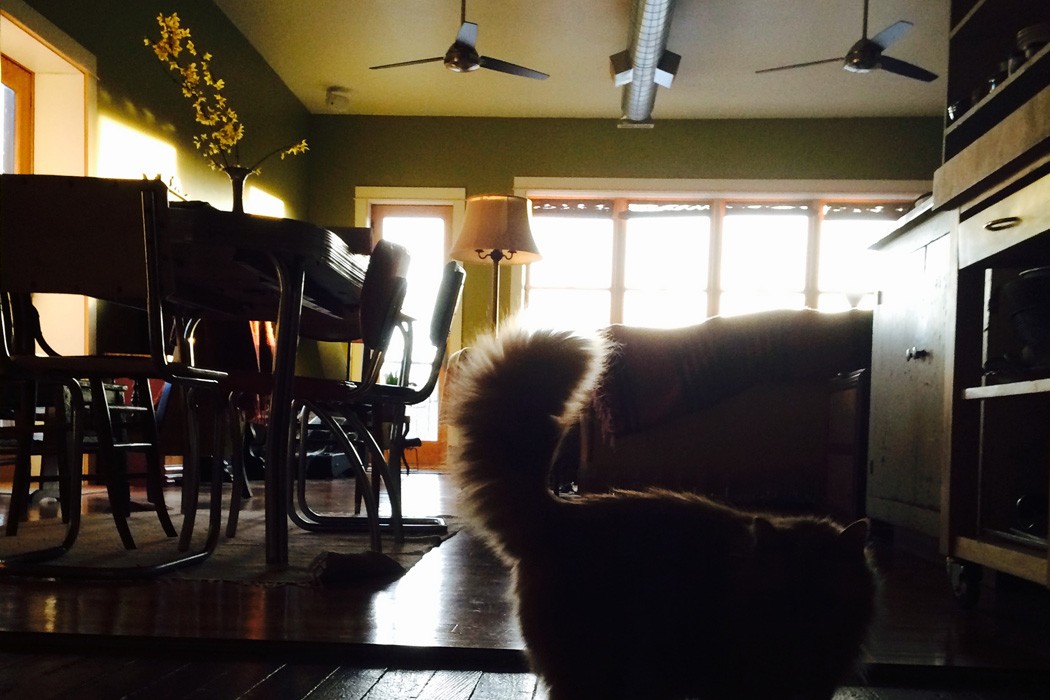Werner likes to crouch in his dormer and imagine radio waves like mile-long harp strings, bending and vibrating over Zollverein, flying through forests, through cities, through walls. At midnight he and Jutta prowl the ionosphere, searching for that lavish, penetrating voice. When they find it, Werner feels as if he has been launched into a different existence, a secret place where great discoveries are possible, where an orphan from a coal town can solve some vital mystery hidden in the physical world.
From All the Light We Cannot See by Anthony Doerr
It is New Year’s Day. 2016 has not yet opened its eyes. Rob and I sleep late, roll out of bed, and start prepping in the kitchen as many of the same folks who stayed at our place until 2:30 a.m. make their way back down the block to our apartment for the first waffles of the year—the first cup of coffee, the first egg, the first morning greetings among friends.Fifteen years ago to the day, I was also sharing breakfast firsts with a menagerie of people after a late night. On New Year’s Eve 2000, I and my boyfriend of six years gathered our community to witness our vows to one another. We led our families to the center of the room without rehearsal. Though we had not practiced, the route to each other was as familiar as the songs and hymns we’d chosen for the service. The next morning, we joined our families for breakfast in continued celebration of the new day, the new year, the new household.
Rob and I are a good match in so many ways, with the same interests and tendencies in certain areas, and complementary differences in others. This year, our first real Christmas vacation in I-don’t-know-how-long has been a good example of compatibility: in the cloister of the home we designed and built together, we read for hours, working through stacks of books we set aside for just this season, mine tending toward fiction and his toward non. We holed up by ourselves for much of the time, and yet welcomed the jubilant company of New Year’s Eve and New Year’s Day, and evening trips across the street to the neighborhood bar. On our own, I worked a puzzle and he watched football.
Our January topic for Topology, “Noise & Silence,” got me thinking about one other difference between us, which could be complementary or disastrous. It’s a classic would-you-rather question: would you rather be blind or deaf? Rob, with his love for music and conversation, would rather be blind. I, with my affinity for quiet and visual perception, would rather be deaf.
And yet, as I’ve been reading All the Light we Cannot See by Anthony Doerr over the Christmas break, I’ve been prompted to reflect on what’s good about noise—not the fury of sound that is propaganda, intended to confuse and corrode contentment and provoke consumption, but the sounds that let us know where we are and with whom we share that place. Doerr takes readers deep into the world of the second great war through the hungry ears of a German orphan named Werner and a blind French girl named Marie-Laure. For them, the sounds of the world are the means through which not just their bodies, but their spirits survive the worst that human beings can do to one another. In a much different time, under much different circumstances, Doerr’s story causes me to wonder: what might I miss if I were propelled permanently into the world of silence I so often crave?
I begin to pay attention and notice the familiar clinking of the spoon against the mug that Rob has had for over twenty years as he stirs cream and sugar into his coffee. From the retail level below our apartment, I hear the sound of the back door as the morning volunteer arrives to tend the fair trade shop, and the coffee grinder and the bright conversation of the regulars and the high pop-pop-pop of another kid trying out the hand drums. I hear a rain of seeds as a sloppy little bird dives headfirst into the feeder outside the window.
In just a couple of days, I will emerge from the hibernation den of the holidays to re-remember the routines of daily work: the cold diesel engine buzzing to life; NPR’s reports about how life went on while I slept, easier for some than for others; the gentle ee-ee-ee of the goat eager for food and attention; the breeze winding through the hills and vales snagging against the tall, frozen grasses; and if the wind is blowing in the right direction, the terce bells from St. Gregory’s Abbey, calling all the world to pause, repent, give thanks, do justice, love kindness, walk humbly.
It is an absurd exercise—would you rather be deaf or blind?—but in spite of the artificiality, the consideration somehow brings me back to compassion. The fictionalized past of Marie-Laure and Werner is an antique dream, and yet it demands of us another act of imagination to remember those for whom the sounds of home are lost, replaced by the sounds of violence, fear and war—cries of hunger in exchange for the mundanity of boiling water in the kettle, the pre-dawn crunch of bus tires on gravel calling refugee children to hard labor rather than to school. For too many, the sounds of a hopeful future and even the luxury of boredom have been drowned out by the sounds of despair as belonging is displaced by otherness.
I am sure I would rather be neither blind nor deaf, but I hope whatever senses remain in the years I have left are always attuned to both the gifts and the sufferings of this wonderful, terrible world. And when my capacities fail, may there always be someone who can take my hand and lead me back not just to my own sense of home, but to a more expansive desire that all creatures may know a place to belong in community, coupled with the will to help make it so.




